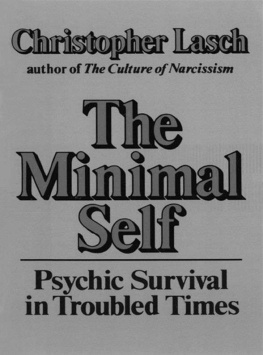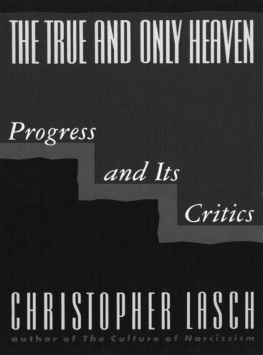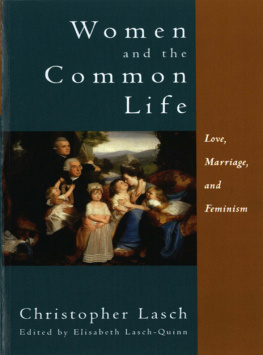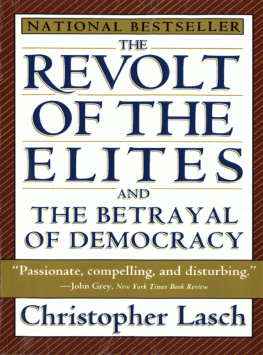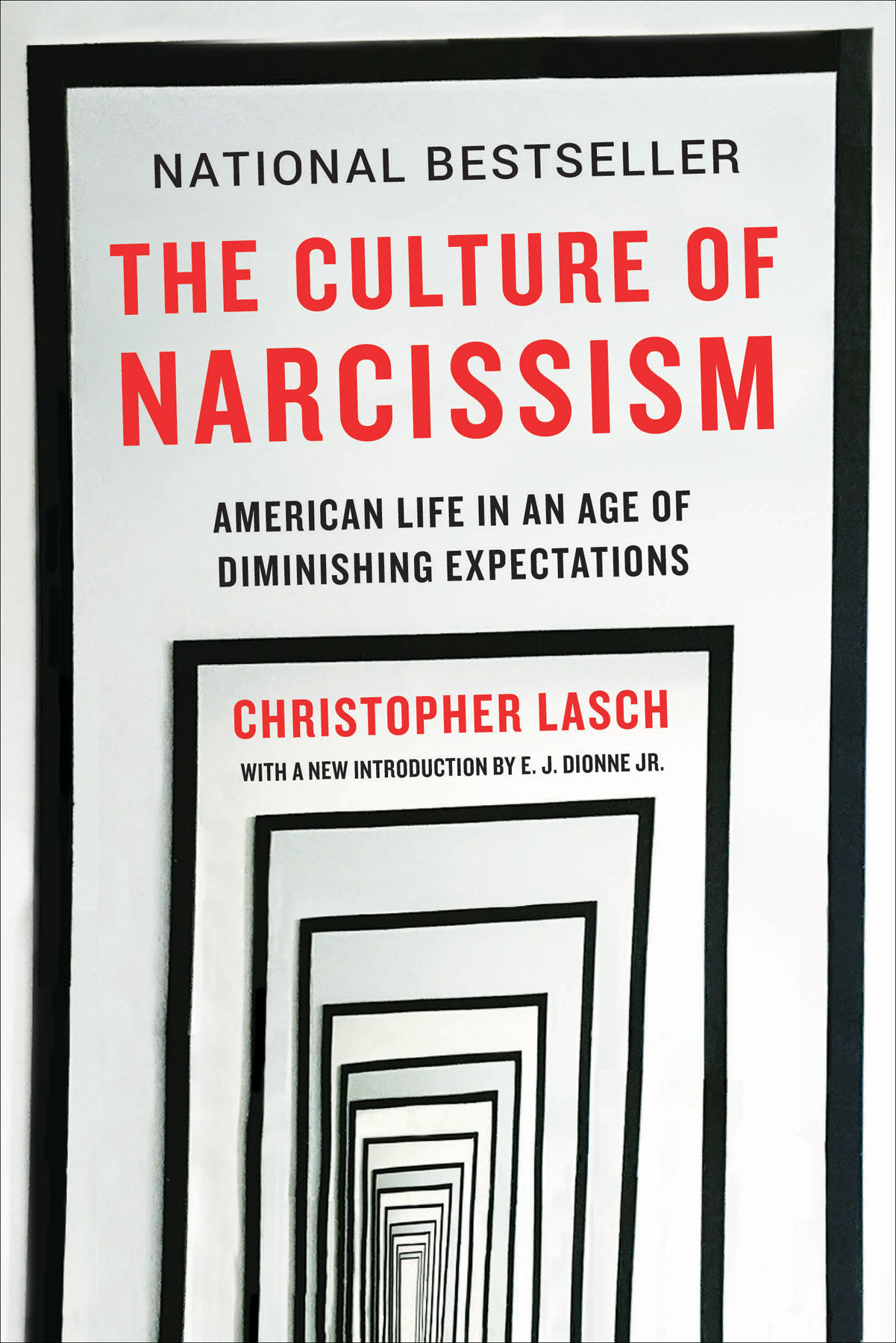Contents
Guide
Page List
BOOKS BY CHRISTOPHER LASCH
The Revolt of the Elites and the Betrayal of Democracy (1994)
The True and Only Heaven: Progress and Its Critics (1991)
The Minimal Self (1984)
The Culture of Narcissism (1979)
Haven in a Heartless World: The Family Besieged (1977)
The World of Nations (1973)
The Agony of the American Left (1969)
The New Radicalism in America (1965)
The American Liberals and the Russian Revolution (1962)
THE CULTURE OF
NARCISSISM

American Life in an Age of Diminishing Expectations
Christopher Lasch
Introduction by E. J. Dionne Jr.

W. W. Norton & Company
Independent Publishers Since 1923
New York London
Copyright 1979 by Christopher Lasch
Introduction copyright 2018 by E. J. Dionne Jr.
First published as a Norton paperback 1991, reissued with a new Introduction 2018
All rights reserved
For information about permission to reproduce selections from this book, write to Permissions, W. W. Norton & Company, Inc., 500 Fifth Avenue, New York, NY 10110
For information about special discounts for bulk purchases, please contact W. W. Norton Special Sales at specialsales@wwnorton.com or 800-233-4830
Book design by Dana Sloan
COVER DESIGN BY YANG KIM
COVER PHOTOGRAPH KRISTINA PENEVA / EYEEM / GETTY IMAGES
The Library of Congress has cataloged the printed edition as follows:
ISBN 978-0-393-35617-5 (pbk.)
ISBN 978-0-393-35692-2 (ebk.)
W. W. Norton & Company, Inc., 500 Fifth Avenue, New York, N.Y. 10110
www.wwnorton.com
W. W. Norton & Company Ltd., 15 Carlisle Street, London W1D 3BS
TO KATE
For she is wise, if I can judge of her,
And fair she is, if that mine eyes be true,
And true she is, as she hath provd herself;
And therefore, like herself, wise, fair, and true,
Shall she be placed in my constant soul.
THE MERCHANT OF VENICE, II. VI
CONTENTS
by E. J. Dionne Jr.
THE CULTURE OF NARCISSISM
The Vocation of a Critic
The Culture of Narcissism seems to leap across the decades. Again and again, it speaks to struggles two generations removed from the era that provided the setting for Christopher Laschs enduring masterpiece.
Its contemporary feel arises in part because narcissism has been one of the dominant words in American politics since the election of Donald Trump as president in 2016. But even more impressive than the immediate relevance of a single word is how a book published in 1979 identifies so many of the discontents still roiling Americas social and political life in our day.
Lasch bemoans the degradation of truth, the growing distance between elites and the less privileged, and the struggles of the American family. He warns about the social and psychological costs of the American workers loss of control over the conditions of labor. He explains the rise of a pervasive distrust of those in power (a natural public concern in the wake of the Vietnam War and Watergate) and mourns the transformation of politics into a quest not for social change but for self-realization. He highlights the paradox that ours is a society dominated by corporate elites with an anti-elitist ideology. It would be hard to find a better phrase to describe what Trump is about.
After Trumps election, the historian Kevin Mattson, a student of Laschs, wrote of how often he was asked after the 2016 election if we were entering a Lasch moment. The new interest in Laschs work focused more on The Revolt of the Elites, his final book, than on this one. Yet many of the themes the revivalists cited run through these pages as well. Jill Lepore, for example, spoke of Laschs uncanny prediction of a democratic crisis resulting from the fact that elites speak only to themselves, partly because of the absence of institutions that promote general conversation across class lines. Ross Douthat, the conservative New York Times columnist, similarly lifted up Laschs critique of the professional upper classs withdrawal from the society it rules. And the most unexpected praise for Laschs work, as Mattson noted, came from Trumps sometimes senior advisor and chief ideologist (presuming that Trump has an ideology), Steve Bannon. Bannon told Axios Jonathan Swan that the 2016 election was a testament to Laschs predictive powers.
If Laschs central preoccupations pointed to the dynamics behind Trumps rise, many passages in The Culture of Narcissism inspire unflattering jolts of recognition about Trump himselfthe lover of praise, the seeker after friendly audiences, the creator of a world in which he is always at the center.
Near the end of the book, Lasch tells us: People with narcissistic personalities, although not necessarily more numerous than before, play a conspicuous part in contemporary life, often rising to positions of eminence. Thriving on the adulation of the masses, these celebrities set the tone of public life and of private life as well, since the machinery of celebrity recognizes no boundaries between the public and the private realm.
Or this, from the first chapter:
Notwithstanding his occasional illusions of omnipotence, the narcissist depends on others to validate his self-esteem. He cannot live without an admiring audience. His apparent freedom from family ties and institutional constraints does not free him to stand alone or to glory in his individuality. On the contrary, it contributes to his insecurity, which he can overcome only by seeing his grandiose self reflected in the attentions of others, or by attaching himself to those who radiate celebrity, power, and charisma. For the narcissist, the world is a mirror, whereas the rugged individualist saw it as an empty wilderness to be shaped to his own design.
We live in a time, Lasch observes at another point, when all politics becomes a form of spectacle. The narcissist, he argues, admires and identifies with winners out of his fear of being labeled a loser. No one is more obsessed with winners and losers than Trump.
Lasch might offer a wry smile at how accurately his descriptions of narcissism fit Trump, but one can be rather certain that he would object to any loose applications of a word he sought to define rigorously. There is irony here, since debates over how Lasch chose to understand and deploy narcissism have trailed this book through the decades.
Lasch, the historian and critical thinker, would no doubt bristle at any attempt to import him into our era to render judgment on a particular politician and a set of circumstances he did not get the chance to know. Reading The Culture of Narcissism sharpens our desire to hear this biting and resolutely unconventional thinker explaining our often inexplicable time.
It is not hard to imagine his expressing sympathy for the frustrations of Trumps supporters, even as he would sharply condemn the rise of racism and nativism. He would certainly rebel at the widespread use of the term populist as an epithet. A sympathy for populism is inherent in what follows, and in his last large study, The True and Only Heaven, Lasch honored populism as the surviving heir to the popular radicalism of the past. Yet he also understood populisms limits. It asks the right questions, he wrote, but it does not provide a ready-made set of answers. The philosophical contradictions among the many movements claiming to be populist suggest how true this still is.


